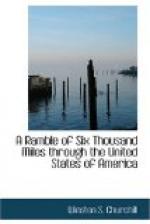His followers appear not to be aware of the fact, that Mr. Owen has not originated a single new idea in his whole book, but has simply put forward the notions of Rousseau, Voltaire, Condorcet, Plato, Sir Thomas More, &c., in other language. His merit consists in this, and no small merit it is, that he has collated the ideas of these philosophers—arranged them in a tangible shape, and has devoted time and money to assist their dissemination.
I find on one of his cards, printed for distribution, the following axioms, in the shape of queries, set forth as being his doctrine,—not the doctrine which he advocates.
“Does it depend upon man to be born of such and such parents?
“Can he choose to take, or not to take, the opinions of his parents and instructors?
“If born of Pagan or Mahometan parents, was it in his power to become a Christian?”
These positions are laid down by Rousseau, in many passages of his works; but as one quotation will be sufficient to establish my assertion, I shall not trouble myself to look for others. He says, in his “Lettre a M. de Beaumont,” p. 124, “A l’egard des objections sur les sectes particulieres dans lesquelles l’universe est divise, que ne puis-je leur donnez assez de force pour rendre chacun moins entete de la sienne et moins ennemi des autres; pour porter chacque homme a l’indulgence, a la douceur, par cette consideration si frappante et si naturelle; que s’il fut ne dans un autre pays, dans une autre secte il prendrait infailliblement pour l’erreur ce qu’il prends pour la verite, et pour la verite, ce qu’il prends pour l’erreur.”
None but a man whose mind had been warped by the too constant contemplation of one particular subject, as Mr. Owen’s mind has been warped by the eternal consideration of the Utopian republic, could suppose the practicability of carrying those plans into full effect during the existence of the present generation. He himself, whilst preaching to his handful of disciples the doctrine of perfect equality, is acting on quite different principles; and he has his new lecture-room divided into compartments separating the classes in society—thus proving that even his few followers are unprepared for such a change as he wishes to introduce into society, and that he finds the necessity of temporising even with them.
Another proof of the variance there is between the theory and the practice of Mr. Owen, may be found in the constitution of his new community. The first article says, that, “An annual subscription paid, of not less than one pound, constitutes a member, who is entitled to attend and vote at all public meetings of the association.” These may be termed the twenty-shilling freeholders of the community.[4] Then follow the other grades and conditions. A donation of one hundred pounds, constitutes a visitor for life: a donation of five hundred pounds, a vice-president for life: and a donation of one thousand pounds, a president, who, “in addition to the last-mentioned privileges,” will enjoy many others of a valuable nature.




